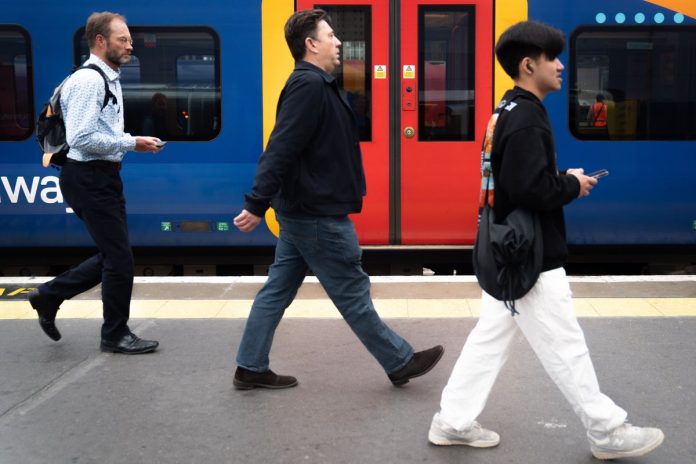As the RMT union goes on its second 24-hour strike in three days to protest pay and the economy, rail commuters in Britain can expect limited and disrupted service for another day.
Given that approximately 20,000 train employees who work for Department for Transport (DfT) contract operators are taking part in the round of nationwide strikes, the service was scheduled to begin later on Saturday morning and end early at night throughout England.
The strike took place on the final day of a seven-day ban on overtime by Aslef train drivers, as well as during ongoing engineering work that has further inconvenienced and harmed commuters.
Traffic jams are anticipated to peak as the school holidays begin in England and Wales on Saturday, warning commuters who must take cars and coaches.
Although there is a wide range in service levels, the majority of the 14 affected train operators are operating at roughly half their regular schedules. Cross-border trains serving Wales and Scotland are reportedly affected as well, despite the fact that there is no direct labor dispute there.
West Coast Avanti runs one train every hour between major cities until the last departure of long-distance trains earlier in the afternoon. Services will be impacted by engineering work on the main line that runs between Glasgow and London. Schedule cuts will also be made by LNER, CrossCountry, and GWR.
Others will completely discontinue service on some lines and many stations, including Northern, TransPennine Express, Southeastern, Govia Thameslink Railway, and Chiltern.
On one of the busiest weekends for flights out of the UK, the majority of the airport’s mainline rail services will run during the day, though reduced Southern and Thameslink trains will take the place of the suspended Gatwick Express trains from London.
The Rail Delivery Group, which speaks for train operators, advised passengers to check again before departing. Up until Sunday morning, there may still be some disruptions.
Following a 24-hour strike on Thursday, a spokesman said the most recent action would disrupt “not only our passengers’ daily commutes,” but also family vacation plans and cause “disappointment, frustration, and financial strain for tens of thousands of people.”.
Next Saturday, July 29, is scheduled to be the third and final day of the RMT’s planned series of three 24-hour strikes.
Since they rejected below-inflation wage offers earlier this year, industry leaders and ministers have not met with the unions, according to the unions, indicating that they are unwilling to meet and discuss issues.
Rail workers on strike, according to RMT general secretary Mick Lynch, continue to wait for a request to resume talks.
“This campaign has likely been ongoing for two years, and we have been on strike for more than a year.
The DfT has requested that unions give members the opportunity to vote directly on proposed agreements first.
Following negotiations between unions and Transport for London, a planned week of strike action on the London Underground was called off yesterday.
When the senior doctors’ union staged a national strike in the UK in opposition to the pay situation, this round of strikes was once more held.
The nation’s state-funded National Health Service (NHS) issued a warning that the 48-hour consultants’ strike would severely disrupt the British health system as consultant doctors and hospital-based dentists started the largest industrial action since 2012 at 07:00 local time on last Thursday.
Due to the walkout, which will last until 07:00 local time on Saturday, thousands of scheduled appointments have been rescheduled. It only spares the so-called Christmas Day cover and a small amount of routine work.
The British Medical Association (BMA) polled more than 24,000 consultants in June about the strike, with the vast majority (20,741 or 86%) voting in favor.
The NHS is forced to cancel appointments and routine treatments while leaving passengers stranded on platforms after months of negotiations between the government and public sector unions failed to end ongoing disputes over pay and working conditions in a number of sectors.













